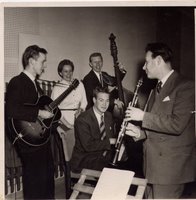But Raney was a bebopper at heart. His first mentor was Al Haig, who had been the pianist on his first significant gig, with Jerry Wald's dance band. There's a wonderful bio on a web page maintained by one of Raney's sons, Jon, where he talks about Haig's influence and his dad's early development:
He did some serious woodshedding with the records that Al Haig recommended to him, in particular Charlie Parker’s and studied them religiously. Not only did he study Parker solos, but also Bud Powell’s, Dizzy’s and Miles. Because he really didn’t have a definitive example of bebop on guitar, he took it upon himself to translate the language particulars of each instrument. So for example on the piano transcriptions, he picked more, on the horn solos, more slurs. He also found different ways to execute the same idea on different strings so that he could connect his ideas and not be locked into any particular position. His picking technique was not one exclusive method – i.e. sweep picking, alternate picking etc. but rather a hybrid. He decided early on that if he just went for the sounds his solutions, with a little bit of patience and diligence, could be worked out organically. His goals were very modest at that point. He simply wanted to be the best bebop interpreter on guitar he could be. This was probably one of the keys to his success. He had a really good foundation in bebop’s linear excellence and a great work ethic that eventually would blossom into full artistry.He has the opportunity to do some wide open, joyful, swing-to-bebop picking on this Swedish session.
Two Teddy Charles veterans, one from each coast, are united in Sweden. Sonny Clark had played on Charles's West Coasters session with Wardell Gray. He was doing a European tour with Buddy deFranco's band. He would return to the US. and the East Coast, as Dinah Washington's piano player, and then do a lot of major work for Blue Note before his untimely death in 1963. This and the Teddy Charles session were his only work for Prestige, so I'm lucky to have this one.
The principal Swede on the session is tenor man Gosta Theselius, and he wails too, meshing perfectly with the coastally and racially integrated American duo. Sweden proved a meeting ground not only for coasts, races and nations, but also genders. The drummer on the date was Elaine Leighton, best known for accompanying Billie Holiday and playing with the Beryl Booker trio. She was in Sweden in 1954 as
 | |||||
| Jimmy Raney with Elaine Leighton |
the drummer with the Beryl Booker all-girl trio (Booker, Bonne Wetzel, bass, and Leighton) that was part of the Jazz USA tour (with Billie Holiday, Buddy de Franco, Red Norvo and others) that came to Europe in 1954. The tour was organised by Leonard Feather. The Beryl Booker trio was being promoted by Feather at the time. Feather also had the trio in his 'Cats vs. Chicks' session for MGM that opposed a Clark Terry-led 'Cats' group (with Lucky Thompson, Tal Farlow, Kenny Clarke) to a Terry Pollard-led 'Chicks' group (with Norma Carson, Mary Osborne and the Beryl Booker trio including Elaine Leighton). [from the Organissimo jazz discussion forum]The second part of the session featured clarinetist Putte Wickman, I was able to listen to "Darn That Dream," an extended version of over six minutes which is all Raney for the first half, dreamy and romantic, with Wickman matching his mood when he comes in at the end.
These were recorded for Metronome in Sweden. Prestige released them on EP and 10-inch LP.
A complete index to musicians covered in this blog here.


No comments:
Post a Comment